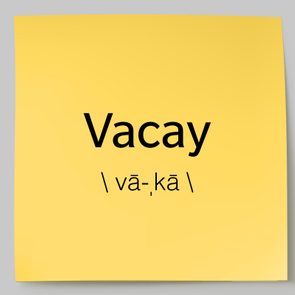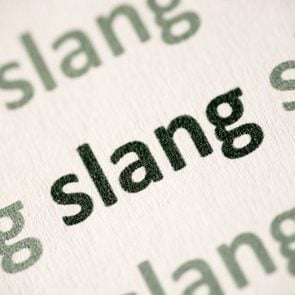IJBOL Is the Internet’s New Favorite Acronym—You’ll Want to Know What It Means
Updated: Aug. 28, 2023

So long, LOL. There's a new slang term taking the internet by storm. Find out IJBOL's meaning—and how to use the term like you know what you're doing.
Remember when LOL was on the cutting edge of internet slang? When you’d instant message your crush with a hearty LMAO or send strings of cry-laughing emojis to pals over text? Well, those days are long gone, and new Gen Z slang terms are taking center stage, officially stealing the spotlight from some of our favorite texting abbreviations and leaving those of us who are (ahem) less young scratching our heads and muttering, What on earth is IJBOL’s meaning?
If you struggle to keep up with online slang or think terms like GRWM (get ready with me) sound like total gibberish, don’t fret. We’re breaking down the internet’s new favorite acronym, IJBOL, so you can spend more time interacting on social media and less time googling “IJBOL meaning.” And TBH (to be honest), using it is so much easier than you probably imagine. It’s a fresh way to convey stomach-busting amusement—IYKYK (if you know, you know).
So goodbye, ROFL. You and the image you conjured will be missed. And hello, IJBOL.
Get Reader’s Digest’s Read Up newsletter for more news, humor, cleaning, travel, tech and fun facts all week long.
IJBOL’s meaning
So what does this snazzy new slang term mean? IJBOL stands for “I just burst out laughing,” a trendier way of letting whomever you’re messaging know that you’re laughing hard at their joke. While it takes a few more taps on the phone to write it out, it’s certainly trendier than a “face with tears of joy” emoji—according to the kids, using one is a telltale sign you’re an uncool millennial.
Beyond IJBOL’s meaning, there are a few other things you need to know about this on-the-rise term. Like, for instance, the fact that it’s actually pronounced when used in an audible conversation. (Yep, it’s one of those funny words that sound fake.) Instead of spelling out each letter like you would when saying, “IDK, my BFF Jill,” you’d simply say “eej-bol” when speaking the term, making it two syllables instead of five.
Given the similarities in how it sounds to Korean words such as chaebol (a family-owned business conglomerate) and shibal (a curse word), plenty of people have confused IJBOL for a Korean term. Others have even assumed the acronym was a cute name for a Korean pop group, only to google it and find out it’s just a catchy phrase for laughing hard.
Laughing out loud online
Terms to express laughter online certainly have evolved over the years, from popular acronyms such as LOL and LMAO to LMFAO (who could forget the “Party Rock Anthem”), ROTFL and so many more. Then there are the different emoji trends that are used to convey laughter, graduating from the “face with tears of joy” emoji to the skull emoji—to signify you’re “dead” from laughter. Or you can simply write “dead” or simplify it with its trendier cousin, “ded.”
With so many options for how to express your laughter through technology, you can really pick and choose what works best for the conversation—and, quite honestly, what would be the funniest in context. A skull emoji would make sense if someone was being hilariously sarcastic. The use of IJBOL would work well if you did, quite literally, burst out laughing in a situation where you maybe weren’t supposed to. (Texting during that meeting, now are we?)
Again, it’s all based on what works best for your current conversation. And hey, if you’re texting millennial friends who can’t help but shuffle to “Party Rock Anthem,” then you can send your “face with tears of joy” emoji or your tried-and-true LMFAO without judgment from the Gen-Z crowd who thinks older slang words need to end.
The origins of IJBOL
Another reason IJBOL is often misidentified as a Korean word has to do with how it was popularized. Although the origins of this popular slang term could date back to 2009, when an Urban Dictionary user originally posted the definition, avid followers in the K-pop community started using it in 2021 as they posted videos of their idols.
The term became particularly popular as its use spread on X (formerly Twitter), where the K-pop community has always been active. From there, it picked up steam across the world, including in the United States.
IJBOL’s meaning really lends itself to use on social media, but you can easily use the term in text conversations as well. Still, the most popular time to use it is when you share a funny video or meme online and want to express the fact that it made you, well, just burst out laughing.
Using IJBOL like you know what you’re doing
It may seem like capitalizing IJBOL would convey a stronger reaction—much like capitalizing LOL indicates stronger laughter, while adding a lowercase “lol” after typing literally anything downplays the humor (cue millennial anxiety). But it isn’t exactly the coolest thing to write out IJBOL in all uppercase letters.
Instead, if you’re really looking to fit in with the Gen-Z crowd, writing “ijbol” in lowercase letters is the way to go. Sure, the technical term is meant to signify that you are bursting out laughing at something, but the use of lowercase shows that you are also not obnoxious online. Capital letters only seem necessary for IJBOL when you’re expressing something that is also completely and utterly shocking, like if something hilarious and mind-blowing happened to your favorite celebrity.
Here are some examples:
- If you’re posting a meme or a funny video, simply captioning it with “ijbol” will do.
- If your kid is doing something funny, you could start writing your story with “ijbol” before diving in.
- If your favorite celeb does something ridiculous, like Nick Jonas falling into a hole on stage during one of his tour performances, you could caption it with “IJBOL POOR NICK” and then maybe throw in a skull emoji, because why not?
As with all new internet terms, there’s a period of buzzy excitement when we encounter a new way to express ourselves. But will IJBOL stand the test of time or turn into one of those overused slang words we really can’t stand? You’ll have to stick around online to find out.
Sources:
- New York Times: “What Is IJBOL?”
- Urban Dictionary: “IJBOL”
- CNN Business: “Sorry, millennials. The 😂 emoji isn’t cool anymore”





















